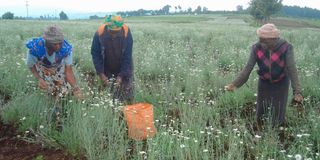Premium
Pyrethrum Processing Company of Kenya to increase production in 25 counties

Workers harvest pyrethrum at the Kenya Agricultural and Livestock Research Organization (Kalro) in Molo, Nakuru County on August 6, 2021.
The Pyrethrum Processing Company of Kenya wants to increase production of the crop in 25 counties.
Company Chief Executive Mary Ontori said her team has put in place strategies to revive the once vibrant sector that controlled more than 70 per cent of the global market, adding that doing so would create thousands of jobs.
She said the company would provide incentives to farmers through subsidised seeds and timely payment.
“We have supported farmers with seedlings in the last two years. Payment is prompt and our field officers visit farms to check on the flowers. They provide an advance of Sh230 per kilo. Final pay is at the end of every month,” Ontori said.
Some of the counties targeted in the plan are Baringo, West Pokot, Nakuru, Nyandarua, Kisii, Muranga and Egeyo Marakwet.
In the 1970s and 1980s, Kenya used to produce more than 18,000 tonnes of pyrethrum a year.
Production fell to about 60 tonnes. In 2019, production stood at 61 tonnes.
“Our target this year is 175 tonnes and hope to get 250 to 5,000 tonnes in the next five year,” she said.
“Farmers are willing to go back to pyrethrum production and we are ready to provide them with seedlings.”
Ontori made the remarks when the company entered into a pyrethrum promotion partnership with the devolved government of Baringo.
Governor Benjamin Cheboi said his administration is willing to revitalise the crop and boost household incomes.
He said Baringo County aims at increasing production from 60 to 1,000 tonnes.
“Farmers stopped producing pyrethrum from 2003 because they were not being paid on time,” Governor Cheboi said.
“The company has said that is a thing of the past. A farmer will now be paid as soon as the produce is delivered.”





